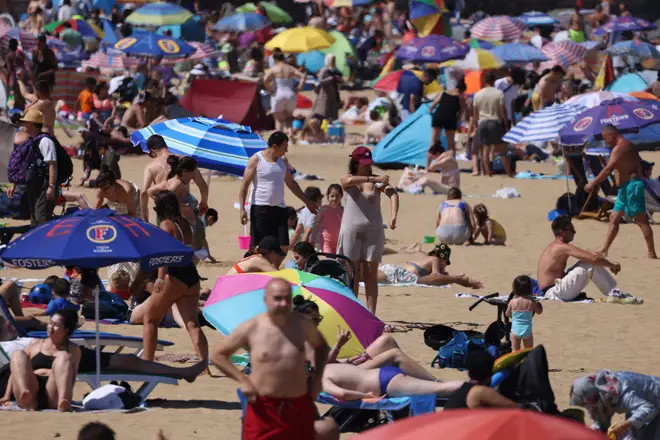
Paul Brand 10am - 12pm
17 July 2022, 07:16

Here's advice from health experts on how to cope in the hot weather, as the Met Office warns lives could be at risk during expected record-breaking heatwave.
Temperatures are expected to exceed 37C in parts of the UK, with the Met Office warning of "a very serious situation" as it issued its first red warning for extreme heat.
Getting to sleep during a heatwave can seem like an impossible task, particularly when you don't have access to air conditioning - but there are steps you can take.
Julie Gooderick, an "extreme environments" expert at the University of Brighton, says it is key to set your environment before sleeping.
The ideal room temperature for sleeping is around 18-21C, she says, and to avoid your bedroom becoming too hot she advises using fans, opening windows at night, and keeping curtains closed during the day.
She also advises using a thin sheet instead of your regular duvet, avoiding napping during the day, and cooling your body down as much as possible - this can be done using cooling pads, a cold shower, or even putting your pyjamas in the freezer a few hours before bedtime.
Another tip is putting damp flannels in a plastic bag in the fridge and using them to cool off when needed.
Read more: Brits urged to 'look out for family and friends' as life-threatening 40C red alert looms
Here are Saturday's extremes 🌡️ ☀️ 🌧️ pic.twitter.com/rtJrz4FelF
— Met Office (@metoffice) July 16, 2022
Extreme hot weather poses the risk of conditions such as heatstroke and heat exhaustion, which can sometimes be fatal. Each year, the UK Health Security Agency (UKHSA) sees excess deaths during periods of extreme hot weather.
Make sure you are drinking plenty of fluids and try to avoid the sun (and physical exertion outdoors) between 11am and 3pm, when the sun is strongest.
The UKHSA advises people to walk in the shade, apply sunscreen regularly, and wear a wide-brimmed hat in the heat, and to make sure fridges and freezers are working properly.

Met Office issues warning for 'unprecedented' level of heat to come
Some people are more vulnerable than others in the heat, particularly those who are aged 75 or older, people with serious health conditions, and those who are unable to keep themselves cool.
Ensure you check in on those who live alone, and be aware of the symptoms of heat exhaustion - these can include dizziness and confusion, a headache and a high temperature.
If you notice someone is experiencing the symptoms of heat exhaustion, they need to be cooled down - make sure they are drinking enough water, lie them down and move them to a cold place if possible.
It is essential to avoid babies becoming dehydrated and overexposed to sunlight - regularly apply sunscreen with a protection factor (SPF) of at least 30, and keep their faces cool with a wide-brimmed sun hat.
Babies less than six months old should be kept out of direct sunlight, the NHS says, and older babies should also be kept out of the sun as much as possible.
Sleep consultant and CEO of Just Chill Mama, Rosey Davidson, advises putting bottles of frozen water in front of a fan to achieve "a mini air con solution" to help babies sleep when it is hot outside.
"You can also hang a wet towel over a chair - pre-freezing this in your freezer helps - the evaporating water cools the air," she adds. "If it is very hot in your baby's room they can just sleep in a vest or nappy."
Not just babies struggle with the heat - pets are also at risk in extreme temperatures.
The Department for Environment, Food and Rural Affairs (Defra) advises dog owners to walk their pets in the morning or evening when it is cooler, and to ensure they have enough shade and water.
You can also keep them cool with pet-friendly frozen treats, and pet-safe sun cream is also available.
Never leave pets alone in parked cars, and make sure you are aware of the key signs of heatstroke - symptoms in dogs and cats can include panting, diarrhoea and restlessness.
Avoid extreme physical activity during the hottest parts of the day, but there are ways to exercise safely during the heatwave.
Try to do so during the cooler hours - in the early morning or evening - and ensure you take enough water.
Going for a swim can be a good way to cool down, but make sure to do so in safe, lifeguarded sites.
"People will want to cool down but don't dive into open water as it's colder than it looks," the London Fire Brigade warns.
"There is the risk of cold water shock, which can cause your body to go into shock no matter how fit you are."